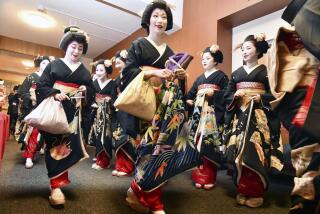Enjoy Kingston but Don’t Be Naive : Crime is higher than elsewhere in the Caribbean. Avoid public transportation and walking at night.
- Share via
KINGSTON, Jamaica — Kingston is a bustling commercial center, one of the West Indies’ educational hubs, and the heart and soul of Jamaican art, music and history. The capital began to gain a reputation as a dangerous city when it was wracked by political and economic unrest in the late ‘70s and early ‘80s. Since then, tourists have, for the most part, avoided it.
Last August, the U.S. State Department reinforced fears when it issued a travel advisory urging Americans to use extra caution when visiting Kingston--and even when staying in isolated villas and small hotels in the North Coast resort areas.
The advisory, which was categorized as a “notice”--the department’s least serious alert--was issued because “the level of crime in Kingston exceeds the level of criminal activity elsewhere in the Caribbean,” said a State Department official in Washington, who asked not to be named.
“We’re not saying that Jamaica should be singled out as a pariah or that there’s less crime in the United States, but we feel we have a responsibility to tell American travelers about problems there, because they may not be as well-armed with information about Jamaica as they would be if they were going to, say, Nebraska,” the official said.
Jamaican officials take issue with comparing their country--the Caribbean’s third-largest--with smaller nations in the region.
“Kingston is a huge metropolis of 900,000 people with all the social ills of a big city,” said Donnie Dawson, director of the Jamaica Tourist Board’s office in Los Angeles. “You can’t compare us to other smaller islands, which our population base outnumbers 10 to 1. Most of those islands would fit inside Kingston,” he said.
Dawson said that avoiding Kingston meant “missing the chance to really experience the diversity of art, music and culture, the ethnic mix and wonderful places to eat and dance.”
So, how cautious, or frightened, should tourists be?
This reporter and a companion spent two weeks in January driving a rental car thorough Jamaica, including three days in Kingston and environs. I can honestly say that we never felt threatened or even uncomfortable. However, caution and alertness are called for.
Unlike major tourist cities such as Hong Kong or London, Kingston’s layout and transportation system are not really tourist-friendly. Public transportation is crowded and the State Department notice advised against using it, for that reason and the danger of pickpocketing and robberies. It urged using Jamaican-licensed taxicabs instead, and also advised against walking city streets at night. In our travels we relied heavily on a city guidebook, not so much for fear of crime but to navigate this complex city as efficiently as possible.
Few tourists stay in Kingston, but there are a substantial number of quality high-rise hotels frequented by business travelers, and some charming guest houses in the Blue Mountains 20 minutes from downtown. Check with the Jamaican Tourist Board for recommendations.
Along the North Coast resort beaches, many Jamaican women approached me to braid my hair, and men wanted to sell us ganja, as Jamaicans call marijuana, which is illegal but possession is punishable by fine, generally not imprisonment.
These hustlers were aggressive but never threatening, and when I made it clear that I intended to alter neither my locks nor my consciousness, they wished me well, saying simply that if I changed my mind, they’d be around.
Throughout the country, we avoided walking in isolated areas at night and, in Kingston, we steered clear of the inner-city ghetto areas--as we would have in Los Angeles or New York City. Kingston was one of the most rewarding stops of our trip. It is also an ideal base for exploring the dramatic Blue Mountains, a spine of peaks rising to 7,400 feet, which are famous for their choice coffee beans and beautiful hiking trails.
One final caution for shutterbugs: While most Jamaicans are happy to pose for photographs, there are an increasing number of islanders who strongly resent being “shot” without being asked; some are quite loud about their displeasure. Some people expect to be paid; others simply don’t want their pictures taken. Ask first, preferably after spending some time talking to the people. You’ll get a more informative experience and they won’t feel like “shoot-and-run” victims.
More to Read
Sign up for The Wild
We’ll help you find the best places to hike, bike and run, as well as the perfect silent spots for meditation and yoga.
You may occasionally receive promotional content from the Los Angeles Times.






